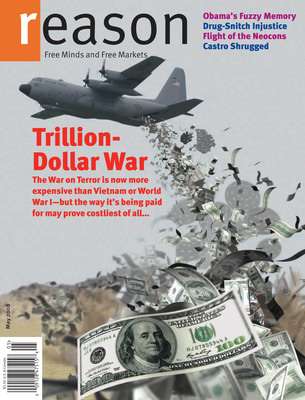The Iraq War is a Reminder: These People Do Not Know What They Are Doing

If you haven't read Reason's symposium on the 10 year anniversary of the start of the Iraq war, stop what you're doing and read it right now. And then when you're done, if you're in the mood for some real rage, go read some of the bad old justifications for going to war—left, right, and center. Here, for example, is David Brooks poking fun at simpleton peaceniks in September 2002. Peace! How unserious. Here's Thomas Friedman at his most dangerously vapid talking up the "terrorism bubble," as if war is just another exercise in management by self-righteous corporate catchphrase. And here's The New York Times' Bill Keller, almost delightedly celebrating his both own surprise and his own moral superiority at discovering that he is a hawk who favors launching a war. In perhaps the most infuriating line of reasoning, Keller notes the multiple divergent justifications for going to war, but dismisses potential worries with the almost-funny assertion that "we are hard pressed to see an alternative that is not built on wishful thinking."
I should admit that at the time, and for several years after, I too tacitly supported the war. My only excuse (not a particularly good one) is that I was young, naive, and stupid, not yet out of college when the first bombs dropped and not confident that I could make a critical judgement based on the limited information I had; I didn't think the Bush administration's case for invasion was particularly convincing, but I assumed that in a matter as grave as war they knew more than I did, and wouldn't rush into a conflict on flimsy pretexts. Boy was I wrong. So were a lot of people.
Reviewing the bipartisan justifications for war in Iraq should serve as a stark reminder to brash liberals, confident conservatives, and strong-government types across the political spectrum that government is a foolishly, frustratingly human endeavor, its projects marked by error and hubris, arrogance and incompetence. To put it bluntly: These people do not know what they are doing—and neither, as the fawning media coverage of Bush's war of choice reveals, does anyone else. Quite the opposite, in fact. They all believe fervently that they know exactly what they are doing, that their plans are foolproof, their designs magnificent, their will strong, their aims noble and historic and humanitarian. But what bloody follies like Iraq reveal is that so many of those tasked with either making or explaining the decisions that affect the lives (and deaths) of thousands or even millions are self-deluding fools, oblivious to the consequences of their own power, and their plans and intentions—whether good or bad or indifferent—do not matter when compared with their violent, ugly results.


Show Comments (57)